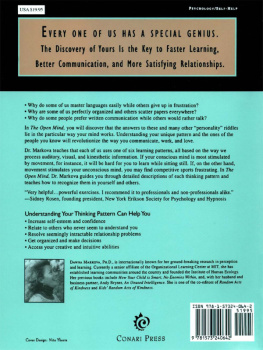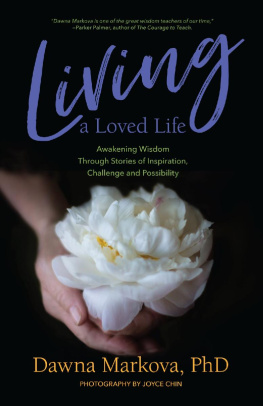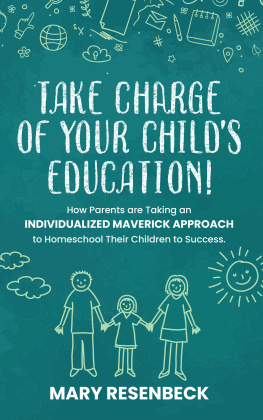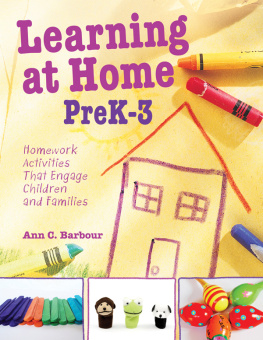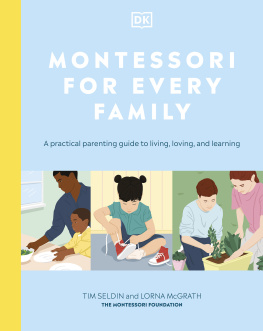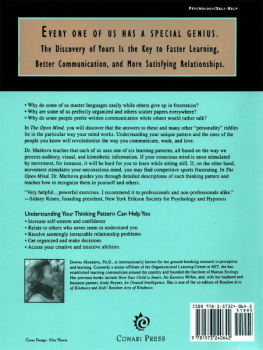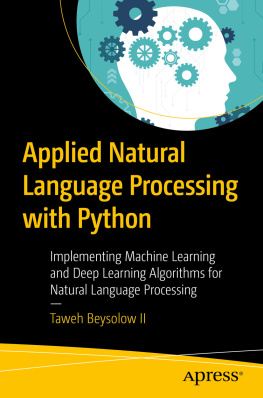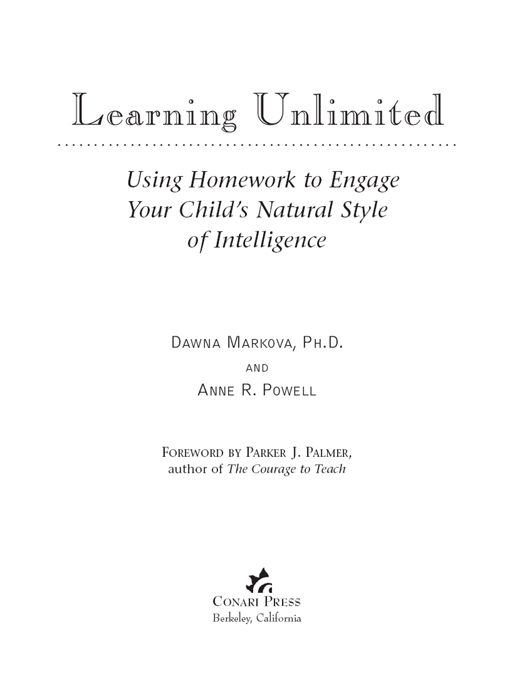
Copyright 1998 by Dawna Markova and Anne R. Powell.
Foreword copyright 1998 by Parker J. Palmer.
All Rights Reserved. No part of this book may be used or reproduced in any manner whatsoever without written permission, except in the case of brief quotations in critical articles or reviews. For information, contact Conari Press, 2550 Ninth Street, Suite 101, Berkeley, California 94710-2551.
Conari Press books are distributed by Publishers Group West.
ISBN: 1-57324-116-4
Cover design: Ame Beanland
Cover illustration: Lisa Burnett Bossi
Book design: Jennifer Brontsema
Library of Congress Cataloging-in-Publication Data
Markova, Dawna, 1942
Learning unlimited : using homework to engage your child's natural style of intelligence / Dawna Markova and Anne R. Powell.
p. cm.
Includes index.
ISBN: 1-57324-116-4
1. Homework. 2. Education, ElementaryParent participation. 3. Study skills. I. Powell, Anne, 1950 . II. Title.
LB1048.M27 1998
372.130281dc21
98-16484
Printed in the United States of America on recycled paper.
10 9 8 7 6 5 4 3 2 1
In the millions of years that have passed, there has never been another child like you You have the capacity for anything
PABLO CASALS
Dedicated to doing the work at home that will help make the world worthy of all its children.
Acknowledgments
To all of those who stand behind us and beside us who have supported us in bringing this forward; for those who stand before us, so they may walk where we cannot go:

and especially, Mary Jane, who would not allow us not to do this.
Contents
FOREWORD
by Parker J. Palmer
CHAPTER 1
Engaging Your Child's Passion to LearnNaturally
CHAPTER 2
Sponsoring Your Child: Becoming a Learning Partner
CHAPTER 3
Tapping in to Natural Motivation: Remembering What They Love
CHAPTER 4
Getting Organized: Keeping Track in New Ways
CHAPTER 5
Managing Time and Energy: Putting Homework in Its Place
CHAPTER 6
Getting Started: Engaging Mind, Body, and Spirit
CHAPTER 7
Understanding Concentration, Confusion, and Distraction: Managing Movements of the Mind
CHAPTER 8
Enhancing Learning Conditions: Personalizing the Study Space
CHAPTER 9
Getting Stuck and Unstuck: Expanding Mental Resources
CHAPTER 10
Calling It a Night: Learning As Its Own Reward
CHAPTER 11
Sharing What You've Learned: Becoming a Learning Resource
CHAPTER 12
The Greatest Gift of All: An Attentive Heart
Forewordand Forward!
I f you have an inner child who is still kicking, you do not need me to tell you that homework is one of the most dread-filled words in the English language.
Homework: the stuff that teachers made us kids do to keep us from living our lives, that held us captive in airless rooms while outside, in that ocean of blue air, a friend or a ball game or a vacant lot called to us like the Sirens. Homework: the stuff of nightmares. I should know. Well into my thirties I had a recurrent dreamI was sitting in a classroom, overwhelmed with panic and drenched with sweat, trying to decipher a final exam for which I was utterly unprepared because I had failed to do my homework all semester long!
Given homework's horrors, it is astonishing that Dawna Markova and Annie Powell have written about it in a way that lifts the spirits, opens the heart, and illumines the mind. Reading this book about homework and its potentials, I understood for the first time that this dreadful word is made up of two words I cherish: home, a place of safety where the heart is, and work, a form of human activity through which we can discover more about who we are and how we might serve the world. Home-work ought to be a good thingand this book shows us how it can become just that.
The key to the miracle that Dawna and Annie pull off in this book is simple and yet profound: they approach the child who must do the homework with deep respect. These authors are not concerned with keeping the state, the school, or the teacher satisfied, nor are they concerned with showing children and their parents how to beat the system. They are concerned with honoring and serving the soul of the child, with keeping the adventure of learning alive in young people.
Of course, learning comes naturally and joyfully to childrenuntil we elders beat it out of them. So, in order to serve children, this book addresses us elders as well, and does so in the same spirit that it addresses children: with respect for our souls. Reading this book, I had a second revelation: not only can homework be life-giving for children, but helping a child with homework can be life-giving for adultsif the helper internalizes the spirit that infuses these pages.
I wish this book had been around fifteen years ago when one of my own children, who was mildly dyslexic, entered high school on what seemed a swift slide into academic failure. I remember spending hours and hours, evening after evening, month after month, trying to help him cope with his homework. And I remember, with sadness, how tense and tearful and tiring those hours were for both of us.
With great gladness I note that this same child is now finishing his Ph.D. in a science whose name I can neither pronounce nor spell! Clearly, he found ways to stop his slide and reclaim his giftsand I would like to believe that some of the caring for him that I expressed through those painful hours of homework helped him do so. But reading this book, I understand that those hours need not have been so painful, that had I approached them differently, they would have served me better as well as my son.
Though this book is filled with practical advice about what parents can do in such difficult situations, methods and techniques are not its primary emphasis. Instead, the authors emphasize the fundamental qualities of being human without which the most well-intended techniques will be to no avail. They help us cultivate and deepen our conviction that the child we are working with is a gifted childgifted, as all human beings are, with a desire to learn, a desire to grow, a desire to offer his or her gift to the world. And they help us understand that we, the elders, have the same gifts.
Erik Erikson said that in midlife, we elders must choose between stagnation and generativity. Stagnation means shutting down on life because we are too frightened to embrace it fully. Generativity means opening up to life in a particular way, a way that combines creativity with caring for the rising generation; it means turning toward, not away, from the children who depend on us, and on whom we depend. Teachingwhether in the classroom or at the kitchen tableis creativity in service of the young. There is no greater calling for those of us who want to inhabit our adult lives to the fullest.
This wise and winsome book will not only help youngsters experience homework as something life-giving rather than life-sapping. It will bring new life to parents, older brothers and sisters, aunts and uncles, grandparents, and other caring adults who want to help those youngsters find their birthright gifts and ways to offer them to the world.
Parker J. Palmer
Parker J. Palmer is a writer and traveling teacher. His latest book is The Courage to Teach: Exploring the Inner Landscape of a Teacher's Life (San Francisco: Jossey-Bass, 1998).
Next page

